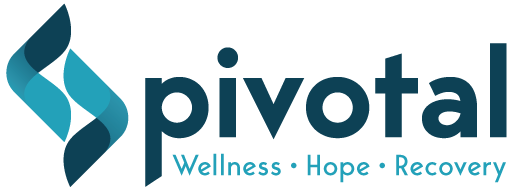Substance Use Disorder Services
Your Wellness Matters
At Pivotal, we assist those currently experiencing problems with the use of alcohol or other substances, as well as those required to participate in treatment for substance misuse.
Seeking help for substance use disorder can be a difficult but crucial step towards recovery. It's important to remember that we are available to provide support, hope, and guide you towards a healthier lifestyle. We offer a confidential, private, judgement free zone — available to all ages.

Substance Misuse Programs and Services
Crisis Care
The mission of the Pivotal Crisis Intervention Services is to provide 24 hours a day, 365 days a year, access to emergency substance misuse and crisis intervention services to any individual presenting for services. Crisis intervention services provide emergency intervention services, including clinical evaluation of the problem, appropriate interventions and timely disposition to admit to inpatient care or refer to outpatient services. The Crisis Line is always available at 1-800-622-3967.
Substance Use Disorder Case Management
Substance Use Disorder Case Management is available for the purpose of ensuring follow through with identified providers, providing additional support in the community if primary services are to be provided in an office setting, addressing other needs identified as part of the assessment and/or established the beneficiary with another provider and/or level of care. This service may be provided individually or in conjunction with other services based on the needs of the beneficiary. The Case manager will connect to resources and supports in the community specifically pertaining to housing, finances, employment, seeking insurance, medical services, and increasing independence.
Medication Management & Psychiatric Services
Medical intervention is often needed as a part of an individual's treatment regimen. In many cases, those services can be provided by the primary care provider, such as when the psychotropic medications are fairly routine (e.g., antidepressants). In cases where an alternate prescriber is not available, or cases that are more complicated or need close coordination with other mental health services, the services are provided by Pivotal.
Substance Use Disorder /Co-Occurring Individual Therapy
The American Society of Addiction Medicine (ASAM) Criteria are used to determine substance abuse treatment placement/admission and/or continued stay needs. The service is based on a level of care determination using the six assessment dimensions of the current ASAM Criteria:
- Withdrawal potential
- Medical conditions and complications
- Emotional, behavioral or cognitive conditions and complications
- Readiness to change
- Relapse, continued use or continued problem potential
- Recovery/ living environment
SUD/ Co-Occurring Individual Therapy treatment activity is designed to reduce maladaptive behaviors, maximize behavioral self-control, or restore normalized psychological functioning, reality orientation, interpersonal skills, and emotional adjustment, this enable improved functioning and more appropriate interpersonal and social relationships. Evidence-Based Practices to address substance use disorder and cooccurring disorders will be utilized in therapy.
Recovery Coaching
Recovery Coaching programs are designed and delivered primarily by individuals in recovery and offer social, emotional, and/or educational supportive services to help prevent relapse and promote recovery. They support a beneficiary's journey toward recovery and wellness by creating and sustaining networks of formal and informal services and supports while role modeling that many pathways to recovery as each individual determines his or her own way. The Peer Recovery Coach helps to remove barriers and obstacles while linking the beneficiary to resources in the recovery community.
Medication-Assisted Treatment
Medication-assisted treatment (MAT) is the use of medications for the treatment of substance use disorders. MAT is primarily used for the treatment of addition to opioids such as heroin and prescription pain relievers that contain opiates.
Buprenorphine is a medication approved by the Food and Drug Administration (FDA) to treat Opioid Use Disorder (OUD) as a medication-assisted treatment (MAT). As with all medications used in MAT, buprenorphine should be prescribes as part of a comprehensive treatment plan that includes counseling other other behavioral therapies to provide patients with a whole-person approach.
Medicaid: The American Society of Addiction Medicine (ASAM) Criteria are used to determine substance abuse treatment placement/admission and/or continued stay needs. The service is based on a level of care determination using the six assessment dimensions of the current ASAM criteria:
- Withdrawal potential
- Medical conditions and complications
- Emotional, behavioral, or cognitive conditions and complications
- Readiness to change
- Relapse, continued use or continued problem potential
- Recovery/living environment
